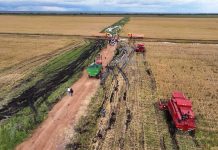Africa-Press – Angola. According to the new pricing regime proposed by the Cabinet Council, the Urban land will now cost 1,500 kwanzas per square meter in Angola, while rural land will be priced at 15,000 kwanzas per hectare, (USD 1 = 912 Kwanzas).
As per the minister of Public Works, Construction, and Housing, Carlos Alberto dos Santos, the new values will serve as a reference for land allocation, being adjusted according to the type of use and existing infrastructure.
“The most important thing to remember is that urban land now has a base value of 1,500 kwanzas per square meter, and rural land, 15,000 kwanzas per hectare. From that point on, coefficients will apply depending on the purpose of housing, services, or agriculture,” the minister explained.
Carlos Alberto dos Santos was speaking to the press on the sidelines of the 10th Ordinary Session of the Cabinet Council, chaired by President João Lourenço.
The new legislation is part of a package of three measures approved by the Executive, aimed at modernizing and regulating the land sector.
The 1st measure created the Parcel Identification Number (NIP), which assigns each plot of land a document with complete information about its location and characteristics.
The 2nd established a single window for land concessions, making municipal administrations the single point of entry and processing of applications, in both urban and rural areas.
“With the single window, we avoid conflicts and overlapping responsibilities.
Now, the entire process begins and ends with the municipal administration, which coordinates with other government agencies,” emphasized Carlos Alberto dos Santos.
The minister also stated that the new regime aims to increase land value and combat land inactivity, imposing progressive penalties on those who own land without any useful use
The measure, he said, aims to encourage productive and rational land use, ensuring greater transparency and efficiency in land management.
The model will also allow municipal administrations to increase their own revenues, which can be applied to projects of local public interest, contributing to community development and improving services provided to the population.
“The State benefits from regulating land use, and local administrations gain additional resources that can be channeled to meet the needs of their communities,” the minister concluded.
For More News And Analysis About Angola Follow Africa-Press






